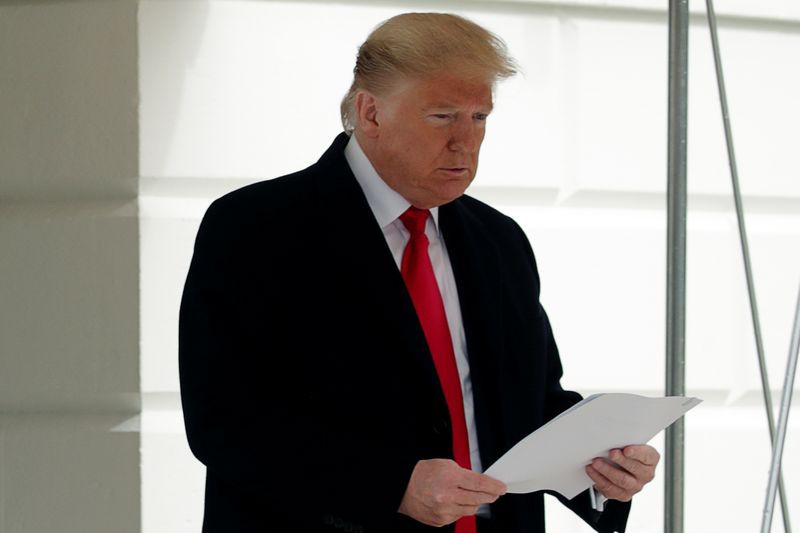By Jan Wolfe
WASHINGTON (Reuters) - A federal appeals court on Friday threw out a lawsuit brought by Democratic lawmakers that accused Donald Trump of violating anti-corruption provisions in the U.S. Constitution with his business dealings, capping a week of political victories for the Republican president.
A unanimous three-judge panel of the U.S. Court of Appeals for the District of Columbia Circuit ruled that the more than 210 House of Representatives and Senate Democrats lacked the required legal standing to bring the case, reversing a lower court judge's decision that had allowed the case to proceed.
Two days after being acquitted by the Senate in his impeachment trial, Trump hailed the ruling as a "total win," telling reporters that "it was another phony case." Elizabeth Wydra, a lawyer for the lawmakers, said they were disappointed in the decision and were weighing their next steps.
Trump still faces two similar lawsuits pending in other courts that also accuse him of violating the Constitution's rarely tested "emoluments" clauses that bar presidents from taking gifts or payments from foreign and state governments.
The lawsuits all have focused on his ownership of the Trump International Hotel in Washington, just blocks from the White House. The hotel, opened by Trump shortly before he was elected in 2016, has become a favored lodging and event space for some foreign and state officials visiting Washington.
The ruling came during a week of positives for Trump as he seeks re-election on Nov. 3. He previewed election themes in his State of the Union address on Tuesday, benefited from the chaotic aftermath of Monday's Democratic presidential nomination contest in Iowa, and was given a lift by Friday's strong jobs report.
Reuters/Ipsos polling shows that Trump's approval rating has been largely unchanged by impeachment, with 42 percent of Americans approving of his performance as president.
Unlike past presidents, Trump - a wealthy real estate developer-turned politician, has retained ownership of his business interests while serving in the White House. The emoluments lawsuits have accused him of making himself vulnerable to bribery by foreign governments.
In the case dismissed on Friday, the appeals court decided that it was bound by Supreme Court rulings that have limited the ability of individual members of Congress to litigate questions that affect the legislative branch as a whole.
The Democratic lawmakers "can, and likely will, continue to use their weighty voices to make their case to the American people, their colleagues in the Congress and the President himself," the three-judge panel wrote. "But we will not - indeed we cannot - participate in this debate."
One of the two other emoluments lawsuits against Trump, brought by the Democratic attorneys general for the District of Columbia and Maryland, is awaiting a ruling by the Richmond, Virginia-based 4th U.S. Circuit Court of Appeals.
The New York-based 2nd U.S. Circuit Court of Appeals last year revived the other emoluments lawsuit, which was brought by a public interest advocacy group, Citizens for Responsibility and Ethics in Washington.

At least one of those cases could end up being decided by the U.S. Supreme Court, according to legal experts.